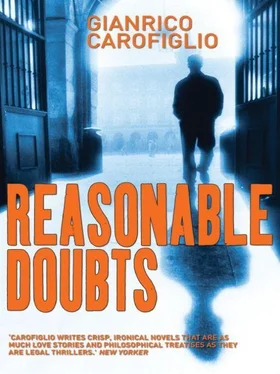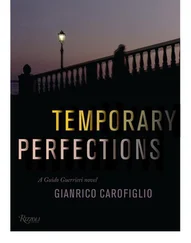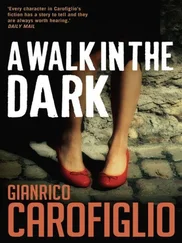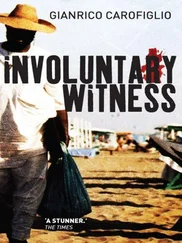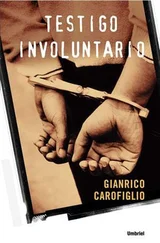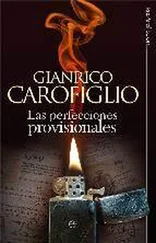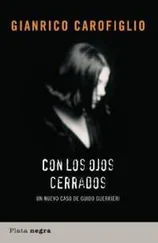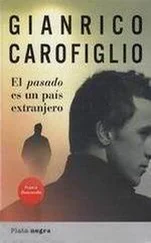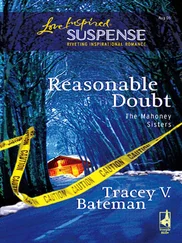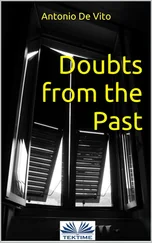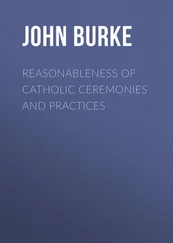Gianrico Carofiglio - Reasonable Doubts
Здесь есть возможность читать онлайн «Gianrico Carofiglio - Reasonable Doubts» весь текст электронной книги совершенно бесплатно (целиком полную версию без сокращений). В некоторых случаях можно слушать аудио, скачать через торрент в формате fb2 и присутствует краткое содержание. Жанр: Криминальный детектив, на английском языке. Описание произведения, (предисловие) а так же отзывы посетителей доступны на портале библиотеки ЛибКат.
- Название:Reasonable Doubts
- Автор:
- Жанр:
- Год:неизвестен
- ISBN:нет данных
- Рейтинг книги:5 / 5. Голосов: 1
-
Избранное:Добавить в избранное
- Отзывы:
-
Ваша оценка:
- 100
- 1
- 2
- 3
- 4
- 5
Reasonable Doubts: краткое содержание, описание и аннотация
Предлагаем к чтению аннотацию, описание, краткое содержание или предисловие (зависит от того, что написал сам автор книги «Reasonable Doubts»). Если вы не нашли необходимую информацию о книге — напишите в комментариях, мы постараемся отыскать её.
Reasonable Doubts — читать онлайн бесплатно полную книгу (весь текст) целиком
Ниже представлен текст книги, разбитый по страницам. Система сохранения места последней прочитанной страницы, позволяет с удобством читать онлайн бесплатно книгу «Reasonable Doubts», без необходимости каждый раз заново искать на чём Вы остановились. Поставьте закладку, и сможете в любой момент перейти на страницу, на которой закончили чтение.
Интервал:
Закладка:
“I often find myself thinking how things might have been for the two of us. If circumstances had been different.”
I said nothing, tried to keep my face as expressionless as possible. I don’t know if I succeeded, but it was a pointless effort anyway, because she wasn’t looking at me. She was looking somewhere inside herself, and outside that room.
“And I often think of that night when you came home with me. When Midori had nightmares and you held her hand. It’s strange, you know. When I think of you, that’s what I remember most of all. Much more than the times we were together, at your place.”
Great. Thanks for telling me that. It does wonders for my male pride.
I didn’t say that.
I told her that I often thought of that night, too, but that the other thing I particularly remembered was that Sunday morning in the park. She nodded, as if I had told her something she already knew. Something that neither of us could add anything to.
“I have to ask you another question, Guido, and you must tell me the truth.”
I told her to go ahead and ask me the question, thinking as I did so how relative the truth is.
“Is Fabio innocent? Forget about the appeal hearing, the papers, your investigations, your line of defence. I want to know if you’re convinced of his innocence. I want to know if he’s been telling me the truth.”
No, you can’t ask me that. I can’t answer that question. I don’t know. He’s probably been telling the truth, but I can’t completely rule out the possibility that he was in league with Romanazzi, Macri and God knows who else in the drugs racket. I can’t even rule out the possibility that your husband did even worse things than that, a long time ago when he was a young Fascist.
I should have answered her like that. I should have told her it wasn’t part of my job as a lawyer to find out if a client is telling the truth. But there were other things I’d done that weren’t part of my job as a lawyer either.
“He’s been telling you the truth.”
At that precise moment, I saw our paths, which had touched for that brief time, separate and go off in different directions, getting further and further away from each other. A few minutes passed, and neither of us said a word. Maybe she too had had a vision similar to mine, or perhaps she was only thinking about the answer I had given her.
“So I’ll see you tomorrow in court?”
“Yes,” I replied.
“Tomorrow in court,” I said, out loud, once I was alone.
45
The assistant prosecutor that morning was Montaruli.
We’d twice had the worst magistrate in the Department of Public Prosecutions and twice had the best, I thought, without any particular effort at originality.
It should have been a bad sign. If Porcelli, or someone like him, had been there, I wouldn’t have worried, even about his closing argument. Some assistant prosecutors stand up when the presiding judge gives them the floor, say, “I ask for the sentence to be upheld,” and consider they have earned their salary.
Some even have the nerve to complain that they work too hard.
Tired and disillusioned as Montaruli might be, he wasn’t a member of that club. It should have been a bad sign that it was him, but instead I was pleased.
“You’ve done an excellent job in this case,” he said, walking up to my bench.
I stood up.
“I read over the transcripts yesterday,” he went on, “and that’s what I thought. An excellent job. I’ll ask for the sentence to be upheld, but I wanted you to know that I really had to think long and hard about it. Much more than I usually do in cases like this.”
As the judges came in, he gave me his hand, and for some reason his grip conveyed a slight sadness, an inscrutable nostalgia. Then he turned and went back to his seat, and so he didn’t see the gesture I made, nodding slightly so that my head touched my closed fist. A greeting and a mark of respect, which Margherita had taught me.
Where was she at that moment?
For a few seconds, as I thought about that question, things around me went out of focus and the voices became a blur. By the time I’d come back to my senses, Montaruli had already started speaking.
“… so we appreciate the efforts made by counsel for the defence. Efforts which have shown a rare degree of commitment, and it is only right to acknowledge them. These rare efforts notwithstanding, no evidence has been produced during this hearing which substantially helps the defendant’s case.
“Confronted with one overwhelming piece of evidence – the discovery of drugs in the defendant’s private car – counsel for the defence has succeeded only in presenting us with a series of conjectures, insufficient in themselves to invalidate the body of evidence on which the original sentence was based. Needless to say, it is not enough to suggest some vague alternatives to the hypothesis put forward by the prosecution for this hypothesis automatically to fall apart.
“If that were the case, no one would ever be found guilty. It is always possible to formulate hypothetical alternatives to the version of the facts which has led to a defendant being sentenced. For these alternatives to constitute a valid basis for a request for acquittal, let alone an actual acquittal, they must at least be somewhat plausible.
“The higher court of appeal has often stated that what is presented as evidence must allow for the reconstruction of the facts and the guilt or innocence of the defendant in terms that are so certain as to exclude the acceptability of any other reasonable solution. Not to mention more abstract, more remote possibilities, based on conjecture and speculation. Otherwise, it would be sufficient to say to the judge: Look, things might not have happened the way the prosecution alleges, because everything is possible, and obtain the defendant’s acquittal for that very reason.
“If that were so, it would no longer be a question of presenting evidence, but of making a demonstration per absurdum following rules borrowed from the exact sciences, which have no place in the exercise of the law.
“In court, what is evaluated is the acceptability of the hypotheses proposed by the parties to explain the facts of the case. The final decision must rest on the most plausible hypothesis, in other words, the one which can encompass within a coherent, persuasive framework all the elements that have emerged from the investigation and the court proceedings.
“In this particular case, none of the new evidence presented by counsel for the defence appears to contradict the hypothesis put forward by the prosecution. On the contrary, it can easily be encompassed by that hypothesis. Let me briefly explain how.”
He briefly explained how. Everything he said was sensible and convincing.
For a few minutes, my attention wandered, and I tried to imagine the kind of closing argument another prosecutor might have made. Porcelli, for example. By the time I again focused on Montaruli’s words, he was talking about Macri.
“There can be no doubt that the witness Avvocato Macri has not conducted himself in a particularly open manner, either in the course of his testimony or indeed in the course of this whole affair.
“Clearly, he has not told the whole truth about his relations with Luca Romanazzi. And it is certainly possible that this Romanazzi is involved in some way in the illegal traffic which forms the basis of this case.
“But none of the new evidence proposed by the defence is incompatible with the charges against the defendant. Let us take it as read that Romanazzi was involved in smuggling the cocaine into the country. In other words, let us take as read something which, although pure conjecture, is reasonable. But even if we do, what of it? Does it rule out Paolicelli’s guilt?
Читать дальшеИнтервал:
Закладка:
Похожие книги на «Reasonable Doubts»
Представляем Вашему вниманию похожие книги на «Reasonable Doubts» списком для выбора. Мы отобрали схожую по названию и смыслу литературу в надежде предоставить читателям больше вариантов отыскать новые, интересные, ещё непрочитанные произведения.
Обсуждение, отзывы о книге «Reasonable Doubts» и просто собственные мнения читателей. Оставьте ваши комментарии, напишите, что Вы думаете о произведении, его смысле или главных героях. Укажите что конкретно понравилось, а что нет, и почему Вы так считаете.
